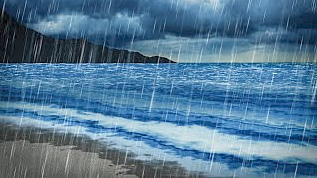I take great pleasure in having been privileged to live the majority of my days within a short walk or drive to the beach. Like residing in proximity to close friends and family, I always feel secure in the presence of the sea. I trust it’s behavior and marvel at its moods. It was not wrong when it evolved us to dry ground. Don’t get me wrong, we are a brutal species. But the life and death scenarios played out beneath the waves are on a scale of brutality we can hardly comprehend. I’ll always remember a Jacques Cousteau program where he narrated (read to yourself with a French accent), “And every moment beneath the waves is played out, in a relentless ballet of death.”

The sea has long burdened us with the inability to know of its secrets, its depths, it’s constant change. It teases us with the relentless transformations of the shoreline upon which we try to live. Allied with the moon so that we never come to see it as a stagnant thing, the sea is forever rushing towards us, pushing us back, then receding unto itself. We claim it is no longer the vast impassable desert which would hurl us off its edges, yet we still accept its sovereignty as the last great frontier for the common man. I know countless people who’ve flown over an ocean in order to cross it; I know only a handful who’ve done so under sail.
The sea rightly boasts of her children. The most massive of creatures – quiet leviathans a thousand-fold our own size – find endless freedom in their birth place. Today’s blue whales are the largest species ever to have inhabited the planet. Yet the moment we dive with our air and our lights, the toothy black-eyed sentinels urge us to leave. We always return, dragging along our rigs and our nets. Like spoiled children we ask for tolerance and then tantrum when it it not granted. But the patient ocean sighs and shrugs in discontentment and occasionally scolds those who prove most disrespectful, with a drowning.
When the Earth was new there were no oceans, but over the eons an atmosphere was formed, the rains began, rains of such a relentless deluge that eventually, the oceans were formed. And although life on our planet was born of, consists of and survives of water, we are all guilty of taking it so for granted. Psychologists speak of the trauma of birth when we are expelled from the warm, fluid security of the womb. We all enjoy a nice warm beach, a refreshing shower, a brisk swim in the creek, a languid dive in the surf, and what child can resist stomping through a puddle? A person can, by sheer will or tragic circumstances, survive a long time without food yet deprived of life sustaining water, we soon wither and die.
This thought has long been the cause of great discouragement for me. So often I’ve seen it happen: the forecaster on TV has a forlorn and downtrodden look on his face. You would think that his prognostication for rain tomorrow would spell the ultimate doom of his viewing audience. And you know what? He’s right. Sailing and fishing trips will be cancelled. Same for a day at the beach. Outdoor weddings without an indoor backup plan will not go well. A few ball games and golf rounds will likewise be postponed. Big deal.
And all day long the radio declares the bad news. Rain, yes rain. Haven’t most of us lived long enough to realize and appreciate the life-giving properties of ocean fed rain without which none of us could survive? The farmers pray for it. The rest of us deplore it. We have come to believe that if the sun does not shine, all is wrong.
I for one love a cloudy day. It gives my eyes a rest. Without all the glare I can see more fully all the things that nature has produced. Have we become so detached from nature that an occasional gray day means depression? It is as much a part of our existence as is breathing and eating.
The sea, it’s clouds and it’s rain. Bless them, enjoy them and be happy. Now, go play in a puddle.
